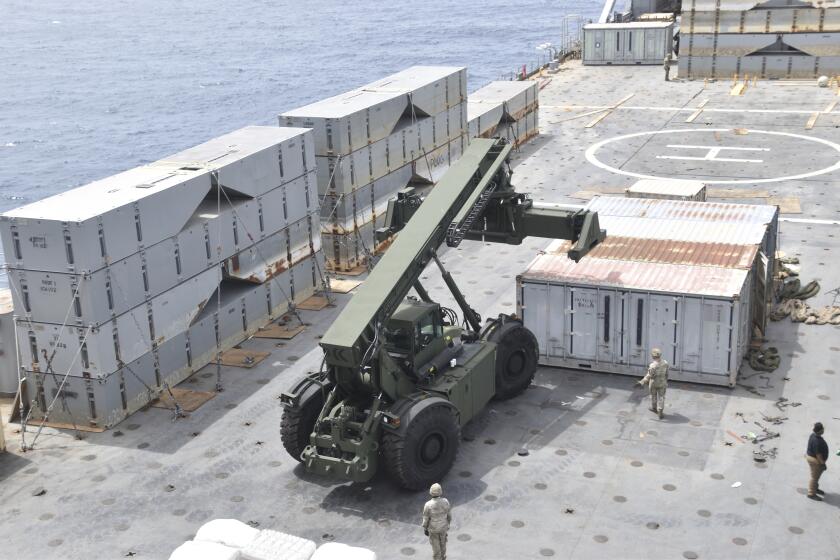Venezuela opposition hopeful of inroads against Chavez in legislative election
Opposition candidates expect to leverage voter discontent into winning a significant share of Venezuelan National Assembly seats in Sunday’s elections, although an electoral law passed last year could help President Hugo Chavez’s allies maintain their current majority.
All 165 seats in the unicameral congress are to be contested in the first National Assembly elections since 2005, when the main opposition parties boycotted the vote, thus ceding 100% legislative control to socialist firebrand Chavez.
This time, opposition parties on the right united under a single banner called Democratic Unity Table to present slates of candidates nationwide. Candidates from leftist parties who have distanced themselves from Chavez also are running hard. Splinter parties Podemos and PPT, which once supported Chavez, could gain 5% to 10% of the vote.
There is a sense that the president, now in his 12th year in office, could be vulnerable.
Many Venezuelans are dissatisfied with an economy that is cratering while the rest of South America grows 4% this year. Some food items are scarce, and salaries haven’t kept pace with a 30% inflation rate, Latin America’s highest. Rising crime has made Caracas one of the deadliest cities on Earth.
Many pollsters expect opposition candidates to garner as many votes as Chavez candidates, if not more. More than 17.7 million Venezuelans are eligible to cast ballots. Opposition candidates are expected to do best in populous industrialized states — Carabobo, Zulia, Miranda and Tachira — as well as in the capital district.
“What is certain is that the monochromatic character of the assembly, with almost unanimous support for Chavez’s policies, is about to change,” said Ricardo Sucre, a Caracas-based political consultant. “It’s not clear what proportion of the assembly the votes will entitle them to, however.”
That uncertainty is the product of an electoral reform law passed last year. Professor Manuel Rachadell of the University of Central Venezuela said the measure gives “over-representation” in the assembly to states where Chavez’s support is strong, whereas states where the opposition is prevalent are given fewer seats.
For example, pro-Chavez Amazonas state will get one deputy for each 40,000 voters. But Zulia state, which has voted against Chavez in recent elections, will get one deputy per 250,000 voters, Rachadell said.
Chavez claims that his “socialism for the 21st century,” which involves redistribution of oil wealth, public assets and some private assets to the poor, has reduced poverty, improved education and ensured basic healthcare for all.
In a campaign speech on Sunday before the close of the campaign, Chavez promised that candidates of PSUV — the initials stand for Venezuela’s Only Socialist Party in Spanish — would win a “new revolutionary hegemony” and retain no less than two-thirds of the assembly.
But fractures within his base have become evident in recent years. Onetime allies, such as Lara state Gov. Henri Falcon, have left Chavez’s PSUV, claiming that his autocratic and centralized style of governing takes the oxygen out of state and local initiatives.
Chavez’s policies have included government takeovers of banking, energy, food and telecommunications companies as well as supermarket chains. The takeovers have been financed by oil revenue: Venezuela is the fifth-largest exporter of oil to the United States after Canada, Mexico, Saudi Arabia and Nigeria.
But the takeovers have spooked domestic and foreign investors, As a result, Venezuela’s factories and farms are in decline, and the nation is forced to import increasing quantities of basic foodstuffs. Housing is scarce because developers feel vulnerable to squatters.
At the close of campaigning Thursday, the Democratic Unity Table’s executive director, Ramon Guillermo Aveledo, predicted that the elections would be “like David versus Goliath, and will turn out the way the story in the Bible ended.”
Mogollon and Kraul are special correspondents. Mogollon reported from Caracas and Kraul from Bogota.
More to Read
Start your day right
Sign up for Essential California for news, features and recommendations from the L.A. Times and beyond in your inbox six days a week.
You may occasionally receive promotional content from the Los Angeles Times.






